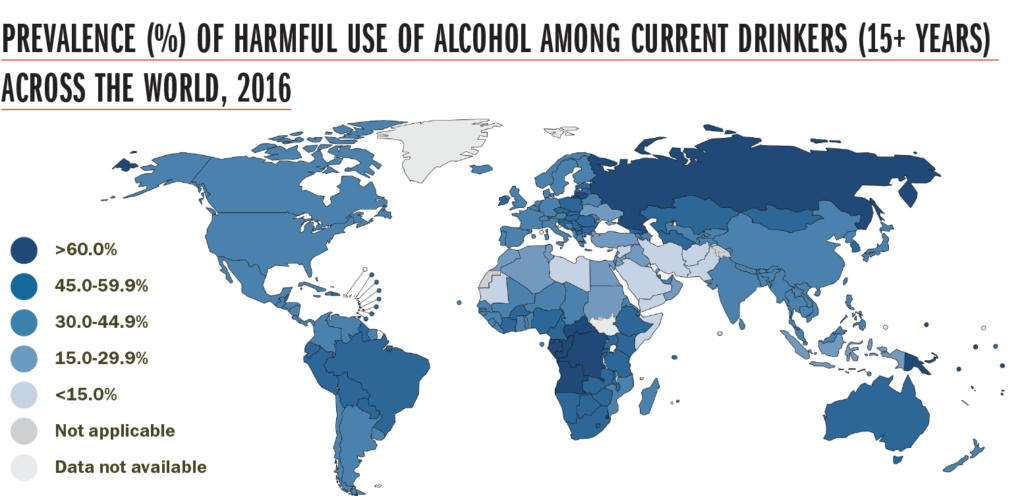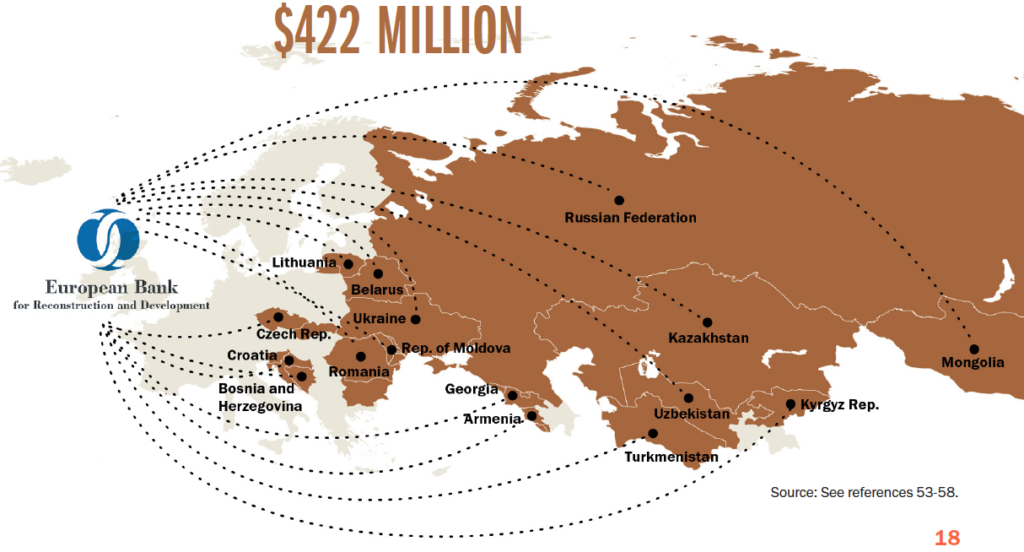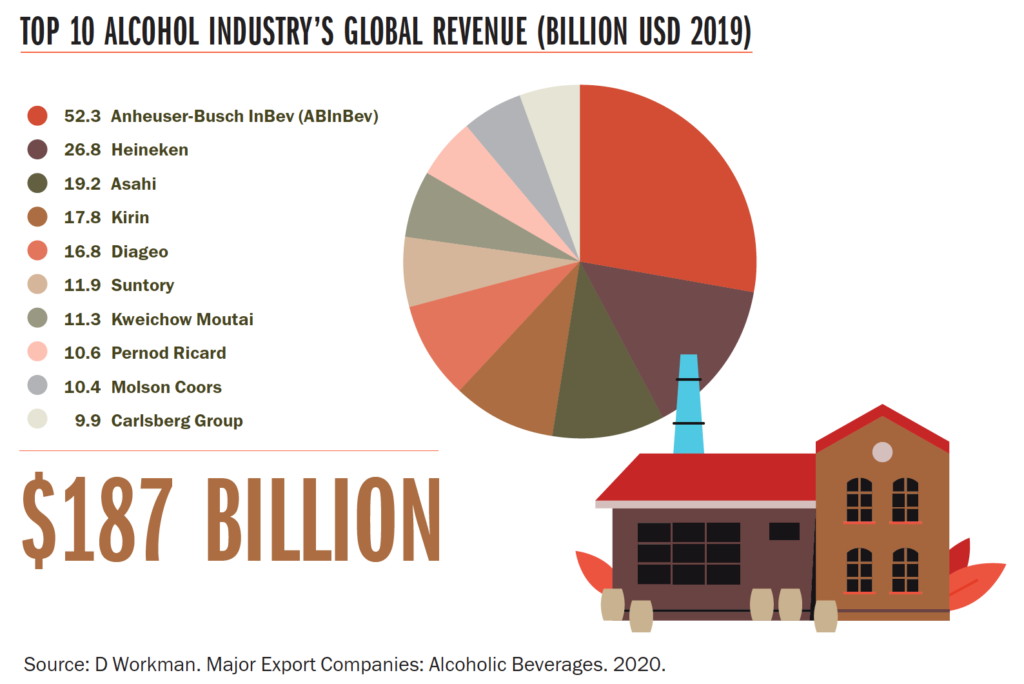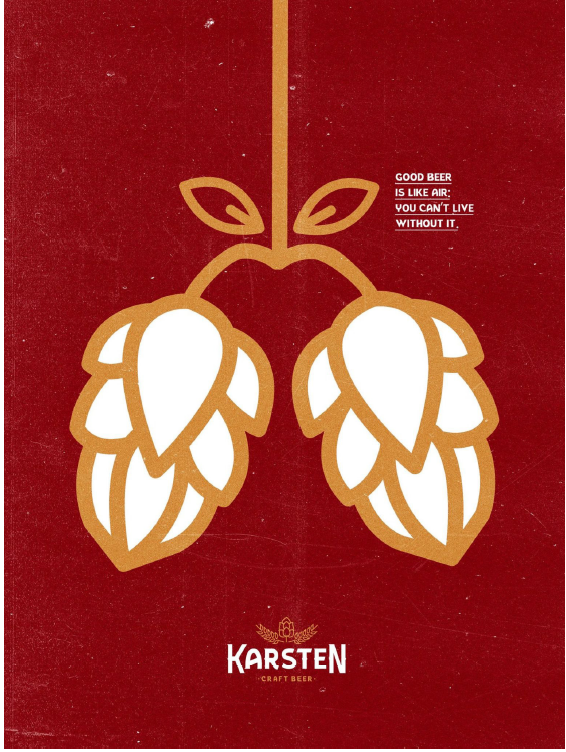Q&A with Nandita Murukuta, Vice President of Global Policy and Research, Rebecca Perl, Vice President of Partnerships and Initiatives and Julia Berenson, Technical Research Writer.
Significant outrage is expressed over government incentives for tobacco and fossil fuels; however, too little is known about the incentives received by the alcohol industry. Harmful alcohol consumption is detrimental and leads to one death every 10 seconds globally, resulting in 3 million deaths per year. It’s a leading risk factor for non-communicable diseases (NCDs) including cancers, cardiovascular diseases and liver disease, and imposes an economic and social burden. Despite this global burden, the alcohol industry receives billions in subsidies including through tax breaks and marketing subsidies, particularly in low- and middle-income countries.
Today, a new report A Sobering Truth: Incentivizing Alcohol Death and Disability published by Vital Strategies uncovers the billions of dollars given to the alcohol industry, whose products cause significant health problems, fuel crime, domestic violence and road injuries.
To learn more about incentives to the alcohol industry, how COVID-19 is impacting consumption, and what governments can do to protect lives and hold the alcohol industry accountable we sat down with authors Nandita Murukuta, Vice President of Global Policy and Research, Rebecca Perl, Vice President of Partnerships and Initiatives and Julia Berenson, Technical Research Writer.

The new report discusses the concept of “perverse incentives.” What does that mean and how does it relate to the alcohol industry?
Economic incentives are intended to do good — they are financial motivations for people or organizations to take certain actions. But when the incentivized “actions” go against the fundamental interests of the payer and have an unintended and undesirable effect —such as, contribute to death and disability—they are, in the words of economists, “perverse incentives.”
In this report, we show that governments and development agencies give billions of dollars of economic incentives to corporations that produce, market, and sell alcohol—an industry whose products create a growing health burden.
In particular, the alcohol industry benefits from a range of significant government-sponsored tax breaks, tax rebates, marketing deductions, production subsidies, and international trade agreement practices that promote alcohol use. These incentives to the alcohol industry are said to be “perverse” because they essentially increase the reach and profits of alcohol companies, to the detriment of individuals and societies. Alcohol strains health systems, harms people, and exerts an unnecessary cost on societies. Moreover, health systems are often underfunded and struggling, especially in low- and middle-income countries. Health systems could certainly use the investment more than the multi-trillion-dollar alcohol industry.

In recent years, there’s been significant coverage over government incentives to the tobacco industry and fossil fuels, why is so little known about incentives to the alcohol industry?
As you noted, unlike the tobacco industry and fossil fuels there is little known about incentives to the alcohol industry. There are a few reasons for this:
First, data on incentives to the alcohol industry are generally fragmented and hard to obtain, which makes it difficult to monitor incentives made to the alcohol industry. We found some products, such as beer, were documented far better than others, and some countries, such as the United States (U.S.), have more publicly available information on incentives than others.
Second, many governments portray incentives to the alcohol industry as beneficial for economic development, and by extension, for society. But there is a direct conflict of interest between the economic objectives of governments and development agencies giving incentives to the alcohol industry and the public health objectives to reduce the harms caused by alcohol.
Example: In Bosnia and Herzegovina, the European Bank for Reconstruction and Development, a multilateral developmental investment bank, boasted its investment of US $1.2 million created one hundred jobs at a local brewery, despite over half of male adult drinkers engaging in heavy drinking.

Third, the alcohol industry is a multi-trillion-dollar industry with vast resources available to employ strategies and approaches to increase their reach and profits, including by interference in government policies aimed at containing consumption of alcohol, such as introducing or increasing taxes on alcohol.
SABMiller, an alcohol producer with headquarters in the U.K., worked closely with the U.K. government to secure incentives in the form of international trade agreement practices, including by removing pricing regulations on beer in India, worth more than US $80 million in sales to the company.
Fourth, alcohol is a highly marketed and glamorized product. AB InBev, one of the largest alcohol producers spent an estimated US $6.2 billion on advertising and marketing rivaling government health expenditures in all low-income countries combined–$6.5 billion in 2017.

How do these incentives affect health, social and economic outcomes in countries around the world?
When governments and development agencies give the alcohol industry financial incentives, they help bloat the pockets of multi-billion-dollar alcohol companies and make it easier to bring their products to consumers that contribute to deaths and disability across the world. Harmful alcohol consumption, such as binge drinking, affects a range of health, social and economic factors. Among them, it:
- Leads to one death every 10 seconds—3 million deaths per year globally;
- Is a leading risk factor for noncommunicable diseases (NCDs), including cancer, cardiovascular disease and diabetes.
- Can worsen the course of infectious diseases, such as tuberculosis, HIV/ AIDS, pneumonia and COVID-19;
- Is the leading global risk factor for death and disability for people 15 to 49;
- Can exacerbate mental health conditions and contribute to violence in the form of homicides, suicides and domestic abuse;
- Caused approximately 370,000 deaths on the road globally in 2016.
In high- and middle-income countries, the cost of alcohol consumption to society is estimated to be more than 1% of the gross domestic product (GDP). For instance, in the United States (U.S.) alone, alcohol consumption costs the U.S. $249 billion in health care and other social costs.
In low- and middle-income countries with lower health protections, alcohol-attributable deaths are substantially higher than high-income countries. And yet, most incentives to the alcohol industry are commonly disbursed from high-income countries to transnational alcohol corporations producing and selling in low-and middle-income countries with less-regulated environments. For instance, during the 2014 World Cup in Brazil, FIFA, the international governing body for football with headquarters in Switzerland, required Brazil to waive US $475 million in taxes on any profits made by FIFA and its commercial partners, including AB InBev, the event’s official beer partner with headquarters in Belgium. The tax breaks to AB InBev were substantial, and yet, in Brazil, binge drinking, which causes many harms, is reported by 51% of alcohol drinkers in the country. While incentives are commonly given as “development assistance” to low- and middle-income countries and are often portrayed by governments as beneficial for economic development, they are being misused to promote alcohol in countries that already face a high burden of harmful alcohol use. Over the past three decades, more than US $422 million of development assistance has been invested in breweries in Central and Eastern Europe, a region with high rates of harmful drinking.
How is COVID-19 affecting alcohol consumption?
During the COVID-19 pandemic, governments are grappling with an increased risk of people under COVID-19 restrictions turning to alcohol in ways that can harm health and increase mortality. In the U.S., a recent study showed that the COVID-19 pandemic has sparked higher use of alcohol. The World Health Organization (WHO) has warned that alcohol use during the COVID-19 pandemic may potentially exacerbate health concerns and risk-taking behavior. NCDs greatly increase the risk of contracting COVID-19, becoming severely ill, and dying from it, and alcohol is a leading risk factor for NCDs.
To make matters worse, alcohol companies around the world are taking advantage of the COVID-19 pandemic for commercial gain. For instance, Brazil brewer Karsten created an ad encouraging consumers to follow three steps to survive the pandemic: “Isolate, use sanitizer, and drink beer for fun.”

Brazil brewer Karsten created an ad with its logo representing a pair of lungs and the slogan, “Good beer is like air: you can’t live without it”
Governments need to watch for changes in alcohol use and related consequences during and after the COVID-19 pandemic and other crises and shocks, as well as the adaption of alcohol industry behavior and corporate actions during such challenging times.
What can governments do to protect people and hold the alcohol industry accountable?
This report proposes that governments and the development community should reexamine current economic incentives to the alcohol industry and advocate for consistent policies that promote health. In the report, we outline an agenda to build a healthier world. Three key recommendations from the agenda include:
- Governments should use finances and fiscal policies to strengthen health systems by reallocating savings or potential new revenue to enhance health budgets. Incentives that can be harmful to health should carefully be phased out.
- Governments should treat alcohol comparably to tobacco and fossil fuels. Alcohol has been almost completely left out of discussions about the impact of incentives on people’s lives – despite its outsized harm to health compared to most other consumer products.
- The development community and governments must be more transparent and intentional about collecting and reporting data on economic incentives they offer to industries, particularly those industries like alcohol that are known to be unhealthy commodities and evaluating their health and social costs. Countries should consider whether incentives are health-positive or health-negative.
Government and development leaders globally should commit to protecting the health and welfare of people globally and ensure that their actions – even those hailed as development aid – do good, not harm.
Access the full report here: http://www.vitalstrategies.org/TheSoberingTruth
Follow us on Twitter: @VitalStrat
About Vital Strategies
Vital Strategies is a global health organization that believes every person should be protected by a strong public health system. We work with governments and civil society in 73 countries to design and implement evidence-based strategies that tackle their most pressing public health problems. Our goal is to see governments adopt promising interventions at scale as rapidly as possible.